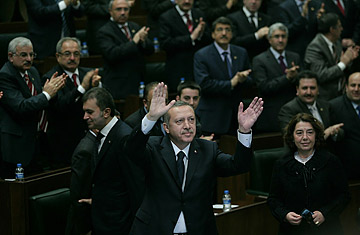
Turkish Prime Minister Tayyip Erdogan addresses lawmakers and supporters of his Justice and Development Party on February, 1, 2011 in Ankara. Erdogan urged Egyptian President Hosni Mubarak to meet his people's "desire for change".
Turkey's tough-talking Prime Minister Recep Tayyip Erdogan, arguably the most popular political leader in the Middle East today, has stepped into the fray to back the protesters in Egypt and urge Egyptian President Hosni Mubarak to announce a plan for the transition to a new government. "It is necessary to announce a road map and a schedule. If this schedule is announced, the masses will be satisfied," Erdogan said on a state visit to Kyrgzstan on Wednesday.
A day earlier, Erdogan had spoken out against Mubarak for the first time after days of silence from Ankara. "No government can remain oblivious to the democratic demands of its people," he said during a parliamentary session, in an address punctuated by loud applause that was broadcast live on Arab TV and in Cairo's Tahrir Square. "There isn't a government in history that has survived through oppression. Know that governments that turn a blind eye to their people cannot last long."
Erdogan's intervention plays to the considerable political capital he wields on the Arab streets, largely due to his fiery ripostes against Israel which began in January 2009 when he publicly chastised Israeli President Shimon Peres for attacks on Gaza at a summit meeting in Davos, Switzerland. The Turkish Prime Minister has used his two terms in office to seek a greater regional role for Turkey — the modern-day heir to the Ottomans who once ruled the region — but has steered clear of democracy and human-rights issues in favor of pragmatism and trade deals. He calls it a foreign policy based on "zero problems with neighbors." Yet his diplomatic ambitions to make Turkey a regional power by playing peacemaker in hotspots like Lebanon and Palestine have met with little success — in January, Ankara withdrew from efforts to resolve the collapse of Beirut's national unity government.
As unrest spreads across the Middle East, many have pointed to Turkey's successful melding of a largely Muslim population with an officially secular and working democracy as a role model for what might come next. The solution, Erdogan said on Tuesday, was in swift elections and reforms that would support national unity. "Despite all its shortcomings, Turkish democracy is a unique inspiration for the Middle East," says Eyup Can Saglik, editor-in-chief of the Radikal newspaper. "If Turkey has been able to maintain its religious and secular identity within a pluralist democracy — and the republic's 80-year experience is one of success — then, leave alone Egypt, Iran too, will one day approach the Turkish model."
Erdogan, who has been in power since 2002, refers to his ruling AK party as a force for democratic change. The religious conservative has used his majority government to chip away at secularist power holders — chiefly the military — while pushing economic growth: Turkey was the second fastest-growing economy in the world last year after China.
Yet Erdogan also has an authoritarian streak and is under increasing pressure at home for using strong-arm tactics against opponents. He has sued more journalists than any previous leader, police routinely round up anti-government protesters at any event he attends, and he recently dismissed critics of a new law limiting alcohol consumption by saying, "let them drink until they spew up."
On Tuesday, though, Erdogan took a more humble tone in his speech aimed at Mubarak: "We are people. We are mortal. We do not last. Each of us will die and be interrogated as to what we have left behind."
